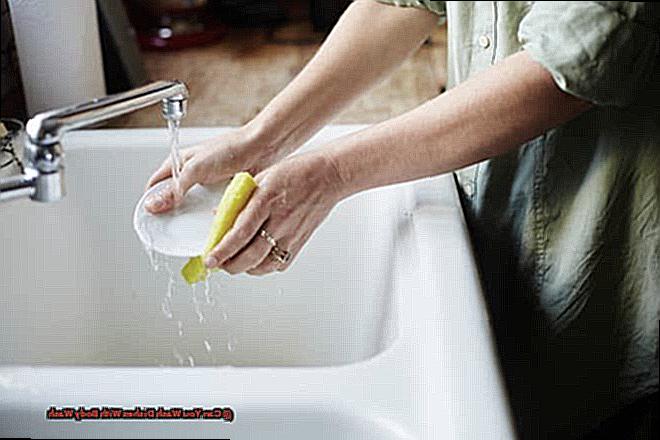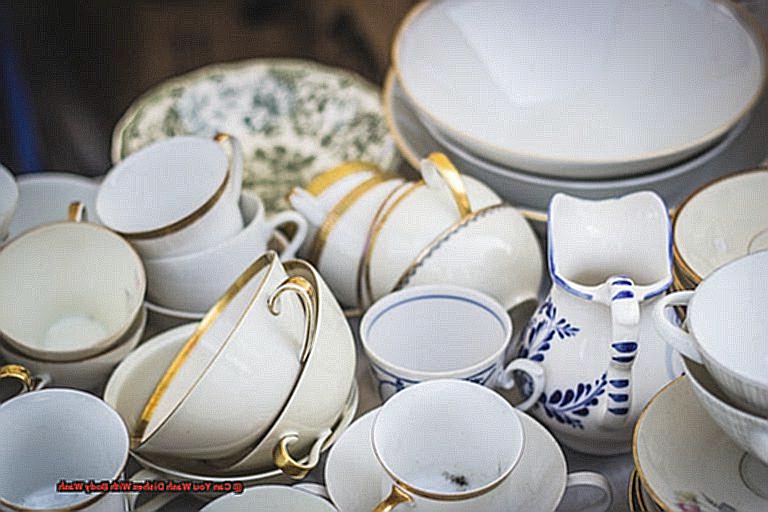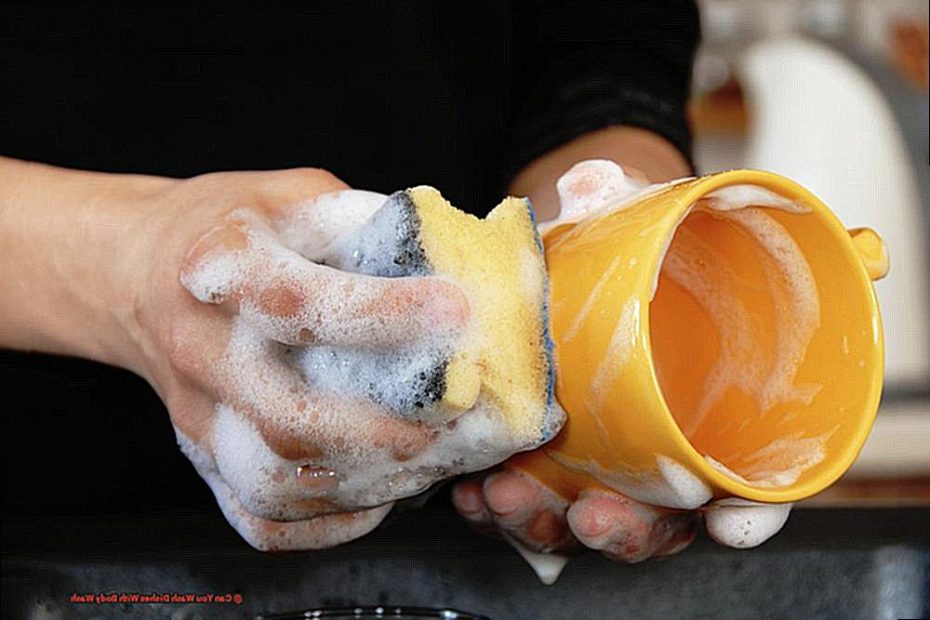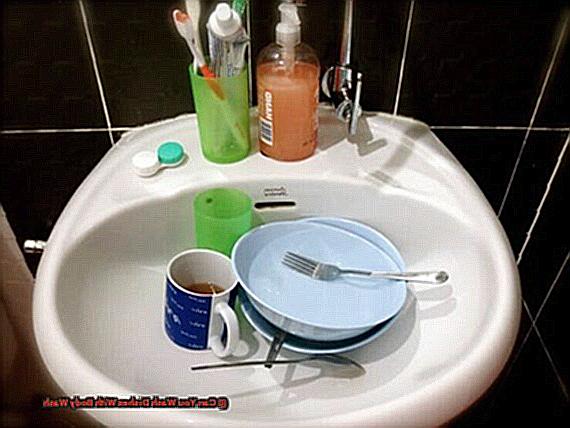Are you tired of constantly restocking your dish soap supply and wondering if there’s a more efficient way to tackle those dirty dishes? Well, have you ever thought about using body wash instead? Yes, you heard that right – body wash. While it may seem unorthodox, there are actually some surprising perks to using body wash as a dish soap alternative. So before you raise an eyebrow, let me break it down for you.
Firstly, let’s talk about the science behind it. Body wash is specifically designed to break down oils and grime on our skin, making it just as effective for cutting through grease on dishes. And with its moisturizing ingredients, your hands will thank you for the added hydration while washing those pots and pans.
But that’s not all – using body wash means one less product cluttering up your kitchen sink or counter space. It’s also a fantastic option for those with sensitive skin who may react to harsh chemicals in traditional dish soaps. Plus, think of all the extra cash you could save by eliminating the need for separate dish soap.
So before dismissing this idea as just another cleaning myth, let’s dive into the details and see if switching to body wash for dishes is truly a game-changer or simply a passing trend.
Contents
- 1 Brilliant Ways to Wash Dishes without Dish Soap
- 2 When Bar Soap Should Be Used?
- 3 Advantages of Dishwasher Soap Bars
- 4 How To Use Dishwashing Bar Soap?
- 5 Can You Wash Dishes With Hand Soap?
- 6 Can You Wash Plates With Laundry Detergent?
- 7 Advantages of Dishwasher Soap Bars
- 8 How To Use Dishwashing Bar Soap?
- 9 Can You Wash Dishes With Hand Soap?
- 10 Can You Wash Plates With Laundry Detergent?
- 11 Conclusion
Brilliant Ways to Wash Dishes without Dish Soap
When it comes to washing dishes, dish soap is the go-to choice for most people. But what if you run out of dish soap? Don’t worry, there are plenty of effective alternatives that you may already have in your home. Here are nine brilliant ways to wash dishes without dish soap:
Everyday Shampoo
Have you ever thought about using shampoo for something other than washing your hair? Well, it turns out that shampoo can also be used to clean dishes. Its formula is designed to remove oil and dirt from hair, so it can easily cut through grease and grime on dishes. Just mix a small amount of shampoo with water and use it like you would dish soap.
Liquid Castile Soap and Water
Liquid castile soap is a natural and environmentally friendly soap made from vegetable oils. It’s gentle on the skin and can also be used to clean dishes. Simply mix one part water with four parts liquid castile soap to create a sudsy solution for washing dishes.
Lemon Juice or Distilled White Vinegar
Lemon juice and vinegar are both acidic substances that work wonders on greasy dishes. Just mix a small amount with water and use it to wash your dishes. Not only will they be sparkling clean, but they’ll also smell fresh.
White Vinegar
White vinegar is a powerhouse when it comes to cleaning. It’s especially effective at removing stains and buildup on dishes. Plus, it’s safe for the environment. Just be sure to use it in small amounts as too much can be harsh on the skin and may damage certain materials.
Bleach
Bleach is a powerful disinfectant that can be used in place of dish soap. However, use caution as it can be harsh on the skin and may damage certain materials. Be sure to use only a small amount when using bleach as a dish soap substitute.
Salt
Salt is a natural abrasive that can help scrub away tough food particles on dishes. Just sprinkle some salt onto a sponge or cloth and use it to scrub your dishes clean.
Baking Soda
Baking soda is another natural alternative that can be used as a scouring agent for dishes. It’s tough on grease but gentle on the skin, making it an effective substitute for dish soap.
Natural Bar Soap
Natural bar soap, such as Castile or glycerin soap, is another great option for washing dishes. Simply rub the soap onto a wet sponge or cloth and use it to clean your dishes.

Soap Nuts
Soap nuts are a natural and eco-friendly alternative to dish soap. They contain saponin, a natural detergent, and can be used to make a soapy solution for washing dishes.
While body wash can be used as a substitute for dish soap in a pinch, it’s not recommended.
When Bar Soap Should Be Used?
When it comes to cleaning dirty dishes, bar soap can be a great choice for those seeking an environmentally friendly option. Not only that, but it also does wonders for cutting through tough grease and grime. However, it may not be the best choice for more delicate dishware or for use in dishwashers.
In my personal experience, I have found that bar soap is especially useful for tackling dishes with stubborn grease and grime buildup. It’s a natural and effective solution that doesn’t require harsh chemicals or excessive scrubbing. And with the growing concern for our planet’s well-being, using bar soap as a dishwashing alternative is a small but impactful way to reduce our carbon footprint.
But as with any cleaning product, there are a few factors to consider before using bar soap on your dishes. For instance, if you have delicate dishware or expensive china, bar soap may be too abrasive and cause damage. In these cases, it would be best to stick with a gentler dish soap specifically made for these types of dishes.
Another important consideration is whether or not you have a dishwasher. While bar soap can work wonders for handwashing dishes, it is not suitable for use in dishwashers. The high pressure and heat of a dishwasher can cause the bar soap to break down and create a soapy mess. Plus, it may leave residue on your dishes, which defeats the purpose of cleaning them in the first place.
In conclusion, while bar soap may not be the perfect solution for all types of dishes, it is certainly a great alternative for those looking to be more environmentally conscious.
Advantages of Dishwasher Soap Bars
Dishwasher soap bars provide numerous benefits compared to liquid dish soap.
| Advantages | Dishwasher Soap Bars | Liquid Dish Soap |
| Cost | Generally more economical as they come in larger sizes and last longer. | Tend to be pricier in smaller containers and can quickly run out. |
| Availability | Easily accessible in most stores and supermarkets. | May not be readily available in smaller towns or rural areas. |
| Gentle on hands | Less harsh on hands compared to liquid dish soap. | Can cause irritation and dryness to hands with frequent use. |
| Environmentally friendly | Most dishwasher soap bars are formulated with natural ingredients, making them a more eco-friendly alternative. | Liquid dish soap may contain more chemicals and additives that can have harmful effects on the environment. |
| No plastic packaging | Soap bars typically come in paper or cardboard packaging, reducing plastic waste. | Liquid dish soap often comes in plastic bottles, contributing to plastic pollution. |
| Cleaning power | Dishwasher soap bars contain concentrated cleaning agents that effectively tackle tough grease and grime. | Liquid dish soap may require more product to achieve the same level of cleaning power. |
In essence, dishwasher soap bars offer cost-effective, eco-friendly, and gentle options for washing dishes. They also possess potent cleaning power and are easily accessible. However, they may not be suitable for fragile dishware or dishwashers and can harbor bacteria if not stored properly. On the other hand, liquid dish soap is gentler on hands and produces more lather with less wastage.
How To Use Dishwashing Bar Soap?
For proper utilization of dishwashing bar soap when washing dishes, follow these steps:
Fill the sink with hot water
Fill your sink with hot water, making sure there is enough room for your dishes to soak and move around.
Lather soap into the water
Take the bar of dish soap and rub it into the hot water until a rich lather is created.
Wet dishcloth or cleaning tool
Make sure to wet your washcloth or preferred dish cleaning tool (such as a dish brush or sponge) with warm water.
Rub soap onto cloth or cleaning tool
Rub the soap bar onto the wet cloth or directly onto your cleaning tool to create a lather.
Clean dishes
Use the soapy cloth or cleaning tool to scrub and clean your dishes, pots, and utensils.
Rinse with warm water
After cleaning all of your dishes, rinse them thoroughly with warm water to remove any remaining soap residue.
Allow dishes to air dry or dry with a towel
You can choose between letting your dishes air dry or drying them with a clean towel before putting them away.
Please keep in mind, using too much bar soap can result in unnecessary suds and make rinsing more difficult. It is best to use a small amount and add more if necessary. Additionally, remember to thoroughly rinse your dishes to prevent any lingering soap residue that may affect the taste of your food in the future.
Overall, utilizing dishwashing bar soap is an effective and cost-friendly option for hand washing dishes.
Can You Wash Dishes With Hand Soap?
The convenience of using hand soap to wash dishes may seem appealing, but it is not recommended for several reasons. Unlike dish soap, which is specifically designed for dishwashing purposes, hand soap is meant for use on our skin. This means that it has a different pH level and is less sensitive than our dishes. As a result, using hand soap can leave behind residue on your dishes, affecting the taste of your food and potentially causing allergic reactions if not rinsed thoroughly.
In comparison, dish soap is more effective at cutting through grease and grime on dishes. Its alkaline pH level makes it ideal for removing food residue, while its powerful grease-cutting abilities ensure that your dishes are properly cleaned. Additionally, dish soap is suitable for all water types and temperatures, making it a practical option for any household.
When it comes to cost-effectiveness, dish soap also has the upper hand. It is specifically designed for dishwashing purposes, meaning that you will likely need to use less product compared to hand soap. This makes it a more economical choice in the long run.
While hand soap may seem like a convenient alternative for washing dishes, it is not recommended due to its lower effectiveness in cutting grease, higher likelihood of leaving behind residue, and potential skin sensitivity issues. Stick to using dish soap for cleaner, safer, and more efficient dishwashing.
Can You Wash Plates With Laundry Detergent?
No, it is not advisable to utilize laundry detergent for washing dishes. Laundry detergents contain chemicals that may not be completely rinsed off and can cause harm if consumed. Moreover, laundry detergent is designed to remove dirt and stains from clothing and is not suitable for dishwashing. It is necessary to use dish soap specifically designed for dishwashing as it is more efficient, cost-effective, and safer for your well-being.

Why is dish soap a better choice?
Dish soap is specially formulated for dishwashing and has a balanced pH level that is safe for both dishes and skin. It also contains surfactants that help break down grease and food residue, making it more effective at cleaning dishes compared to laundry detergent. Dish soap also rinses off quickly and leaves less residue on dishes compared to laundry detergent.
What are the potential risks of using laundry detergent on dishes?
Laundry detergents often contain harsh chemicals such as bleach, enzymes, and fragrances that are not meant for ingestion. These chemicals can be harmful if not thoroughly rinsed off or if they come in contact with food that will be consumed. Additionally, laundry detergent can leave behind a soapy residue on dishes that can alter the taste of your food.
How can I safely use laundry detergent for dishwashing?
If you must use laundry detergent for dishwashing, only use a small amount and rinse thoroughly with hot water. It is also recommended to wear gloves while washing dishes to protect your skin from potential chemicals in the detergent. However, it is still not advised to use laundry detergent on dishes due to the potential risks involved.
It is not safe or effective to use laundry detergent for washing dishes. Dish soap is specifically designed for this purpose and is a safer and more effective option.
Advantages of Dishwasher Soap Bars
These advantages include:
- Cost efficiency: Dishwasher soap bars are generally more cost-effective compared to liquid detergents, making them a budget-friendly alternative for those looking to save some cash.
- Minimal waste: Due to the solid form of dishwasher soap bars, there is less likelihood of product being wasted compared to liquid detergents, which can easily spill or be dispensed in excess.
- Versatility: Dishwasher soap bars can also be used for hand washing dishes, making them a versatile choice for households.
- Eco-friendly: Many dishwasher soap bars come in packaging made from recycled materials and can be disposed of in an environmentally friendly manner.
- Compact storage: Dishwasher soap bars take up less space than bulky bottles of liquid detergent, making them easier to store in smaller kitchens or laundry rooms.
However, it’s important to be aware of some potential drawbacks when using dishwasher soap bars. These include:
- Harsh on skin and delicate items: The ingredients in dishwasher soap bars may irritate sensitive skin and can also be too abrasive for delicate items like glassware or china.
- Risk of bacterial growth: If not properly stored or left wet, dishwasher soap bars can harbor bacteria, so it’s crucial to thoroughly dry and store them after use.
- Reduced lather: Dishwasher soap bars do not produce as much lather as liquid detergents, which may not be as effective in cleaning heavily soiled dishes.
Ultimately, the decision between using dishwasher soap bars or traditional liquid detergents depends on personal preferences and individual needs. For those seeking a more economical and eco-friendly option, dishwasher soap bars may be the better choice.
How To Use Dishwashing Bar Soap?
Cleaning your dishes effectively requires proper use of dishwashing bar soap. Follow these simple steps for spotless dishes:
- Fill the sink with hot water: Start off by filling your sink with hot water. This will help dissolve the soap and create a rich lather.
- Lather the soap into the water: Take the dishwashing bar soap and rub it into the hot water, evenly lathering it for thorough cleaning.
- Rub the soap onto a wet washcloth or cleaning tool: Use a wet washcloth or dish cleaning tool (sponge or brush) to rub onto the bar soap. This creates a rich lather that effectively cleans your dishes.
- Scrub and clean your dishes: With your cleaning tool, thoroughly scrub and clean your dishes, pots, and utensils. The lather from the soap will easily remove grease, grime, and food residue.
- Rinse with warm water: Once all dishes are clean, rinse them with warm water to remove any remaining soap residue.
- Let dry or air dry: After rinsing, let your dishes air dry or use a dish towel to dry them off.
Using dishwashing bar soap is an eco-friendly alternative to harsh chemical-filled dish detergents. With minimal packaging and no harmful additives, bar soaps are a great option for clean and sparkling dishes.
Can You Wash Dishes With Hand Soap?
Hand soap can serve as a viable substitute for dish soap when washing dishes in a bind. Nevertheless, it may not be as efficient at removing tough dirt and oil as traditional dish soap. Furthermore, hand soap could contain elements that could possibly irritate the skin or leave a film on dishes. It is crucial to select a gentle and mild hand soap if using it in place of dish soap.
In certain situations, using hand soap to wash dishes can be a great time-saver and a convenient option. For example, when camping or traveling, using hand soap to clean dishes can be a practical solution. However, it is important to note that hand soap may not have the same powerful cleaning agents as dish soap, so it may require more effort and elbow grease to remove stubborn stains.
While hand soap is generally safe to use on dishes, it is important to choose a mild and gentle formula to avoid any potential skin irritation or residue on dishes. Some hand soaps may also have fragrances or other additives that could affect the taste of food on the dishes. In these cases, it is best to opt for unscented or natural hand soaps.
While hand soap can be used as a temporary substitute for dish soap, it may not be as effective at removing tough stains and grease. It is important to choose a mild and gentle hand soap, especially for those with sensitive skin or allergies.
Can You Wash Plates With Laundry Detergent?
No, it is not recommended nor efficient to utilize laundry detergent for washing plates.
It may also include harsh substances that can be hazardous if consumed or left on plates.
Conclusion
In conclusion, the idea of using body wash to wash dishes may seem unconventional, but it comes with surprising benefits. Not only does body wash effectively break down oils and grime on our skin, making it just as effective for cutting through grease on dishes, but it also provides added hydration for our hands. Plus, using body wash means one less product cluttering up your kitchen space and can be a great option for those with sensitive skin.
However, there are other alternatives such as shampoo, liquid castile soap, lemon juice or vinegar, bleach, salt, baking soda, natural bar soap, and soap nuts – each with their own unique benefits and considerations. It’s crucial to carefully assess which alternative is best suited for your specific needs and preferences.
While bar soap may not be suitable for all types of dishes or dishwashers, it offers numerous advantages over liquid dish soap. It’s more cost-effective, environmentally friendly, gentle on hands and provides potent cleaning power. When used properly by creating a rich lather in hot water before scrubbing dishes clean and thoroughly rinsing them afterwards – dishwashing bar soap can be an effective and convenient option for hand washing dishes.
So, next time you run out of dish soap or want to try something new – consider these brilliant ways to wash dishes without traditional dish soap. By switching up your routine and using unique alternatives like body wash or other natural options – you may find a better solution that works for you.






